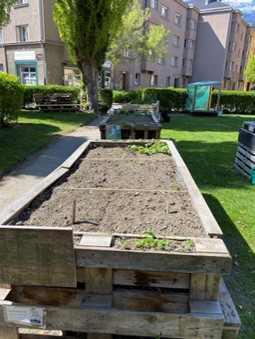The whole world on just one acre of 2000m2
How is it possible to feed the always-rising population of our world? This is a question, students of a lower secondary class raised on a first meeting with the MOST team. We than connected them with the feld:schafft, who are participating in the project of having a “Weltacker” in Innsbruck. There, on 2000m2 everything is cultivated what grows on the acres of our world. To give the students the chance to work on their own projects, the whole project started with the Invite stage, according to the INCREASE trail map of the Manual.
So the students invited some experts to the project and started with a co creation process. Afterwards the students found themselves in small groups and discussed, how it is possible, that everyone on our planet can have the same access to nutrition and what are the existing problems right now.
Together with experts they calculated the carbon footprint of different dishes and it became clear, that the range between different meals is immense. The conclusion was, that just single adaptions can have a big impact. What was really special at this SCP, a lot of different questions related to the overarching topic of sustainability came up. So another point was the question on how to reduce waste. Plastic waste of packaging as well as foodwaste?
The students decided to search for a place to set up raised beds. With the help of their SCP leader and the MOST advisor they again found stakeholder who were willing to participate and a place, which is not far from school and also accessible for community member. The participants were interested community members and a elderly home which is close to the school.
Luckily we found a place, where already existing raised beds were standing (see picture). But the beds were old and in it a lot of undefined herbs were growing. So the students organized a clean up day. The community garden is on a backside of a church, so that also the church was interested in having a clean backyard. So together with the community, the students cleaned the beds and set them up for the rest of the summer. As the beds are also accessible in the afternoon, the students came in touch with different stakeholders and interested persons and both were working together. The raised beds are the answer of the question, on how we can reduce both, foodwaste and plastic waste.

The Weltacker project was part of our MOST-Bike fair, where we advertised a “bike-trip” through Innsbruck, connecting all MOST projects related to the topic of community garden, raised beds, greening of the schoolyard and so on. Together with a couple of community members and local politicians, we drove around Innsbruck, where the SCP leaders presented their project on different stations. The project was also disseminated via the school homepage which led to synergy effects and attracted other schools, to also take part in the MOST project.
